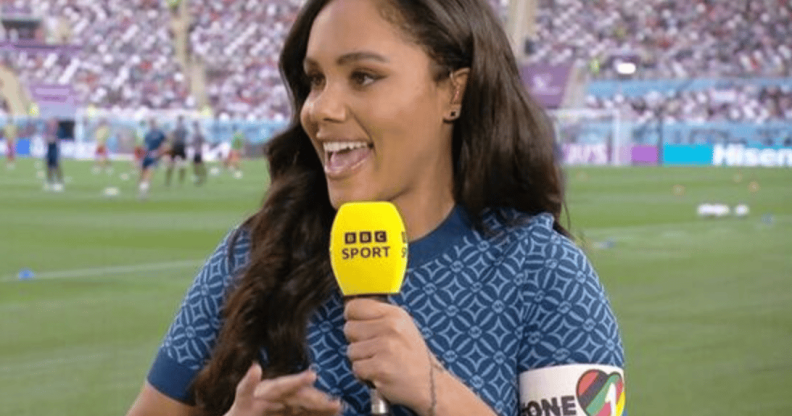BBC’s Alex Scott praised for wearing LGBTQ+ armband while football bosses bend to Qatar’s will

BBC football presenter Alex Scott wears LGBTQ+ armband after teams’ shameful U-turn (BBC Sport)
BBC football presenter Alex Scott wears LGBTQ+ armband after teams' shameful U-turn (BBC Sport)
BBC Sport presenter Alex Scott has been praised for wearing the pro-LGBTQ+ OneLove armband in Qatar.
Alex Scott donned the rainbow-coloured armband hours after England and Wales announced they would no longer be wearing it, because they were afraid of being yellow-carded.
Captains of the England, Wales, Belgium, Denmark, Germany, the Netherlands and Switzerland football teams had previously stated they wished to wear the OneLove armbands to support LGBTQ+ rights, as it is illegal to be gay in Qatar.
However a joint statement from the countries’ Football Associations on Monday (20 November) said that they would no longer do so, because players would be booked.
“FIFA has been very clear that it will impose sporting sanctions if our captains wear the armbands on the field of play,” the associations said.
“As national federations, we can’t put our players in a position where they could face sporting sanctions including bookings, so we have asked the captains not to attempt to wear the armbands in FIFA World Cup games.”
After the countries were criticised for walking back on their promise, former Lioness Scott was seen sporting the band while presenting for the BBC.
Viewers were full of praise for Scott, who opened up about her relationship with former teammate Kelly Smith in September.
Alex Scott you legend pic.twitter.com/Tvzei6sh5s
— Ali Tweedale (@alitweedale) November 21, 2022
alex scott, a queer woman of colour, wearing the one love armband just shows that she has so much more courage than anyone walking on that pitch today— liv (@livthegooner) November 21, 2022
Alex scott a women who has just come out and now is in a country where she she can be killed or imprisoned for being part of the community is wearing the one love armband, brave and powerful stuff from her pic.twitter.com/1f2RYvtpDg— A🦋 (@littlelacasse) November 21, 2022
The threat of sporting sanctions stopped Harry Kane from wearing the OneLove armband, but the legend that is Alex Scott made sure it didn’t go to waste. FIFA can’t book her either.💪 pic.twitter.com/REFjJEWEuH— Ben Jacobs (@JacobsBen) November 21, 2022
England may not be wearing the #OneLove armband, but @AlexScott is right now on BBC. This is more than just LGBTQ+ rights, this is Human Rights 🏴🏳️🌈💙 pic.twitter.com/lSYZUaijqm
— Pride in Football 🏳️🌈⚽️ (@PrideinFootball) November 21, 2022
While Alex Scott did not reference the armband, she had earlier spoken out about LGBTQ+ rights during the beginning of the BBC’s coverage of the World Cup, slamming FIFA President Gianni Infantino for his bizarre speech in which he said he “feels gay” and “feels [like] a migrant worker”.
“We reference Gianni Infantino from what he said… you are not gay, you will never understand travelling to a country where you are fearing for your life just because of who you choose to love,” Scott said.
“To keep saying football is for everyone, we sit here and it’s not, because people have not been able to travel to watch their teams, to support their teams, out of fear.”
Alex Scott is wearing the One Love arm band whilst presenting on BBC One. pic.twitter.com/GAZxwEKw0H— Scott Bryan (@scottygb) November 21, 2022
Jack Murley, presenter of the BBC’s LGBT Sport Podcast, has criticised the decision to no longer wear the OneLove armband during World Cup games, saying it felt like a “gut punch”.
Appearing on BBC 5 Live as it was announced, Murley said: “It feels like a bit of a gut punch to me to hear that a symbol of who you are being OK can get you booked at football’s greatest tournament.
“That is an extraordinary place to arrive at in 2022.”
British human rights campaigner Peter Tatchell added that the OneLove armband was the “tiniest of gestures” towards the LGBTQ+ community at the World Cup, pointing out that it “did not specifically mention LGBT+ people”.
“It was a weak campaign but even that was too much for FIFA, who have bullied the England team to not wear it,” Tatchell said.
“FIFA have crushed the OneLove campaign with the threat of yellow cards. It’s time to show FIFA and Qatar the red card.”
In Qatar homosexuality is illegal, and being found guilty of same-sex relations can result in a lengthy prison sentence, while under Sharia law it is possible for men to face the death penalty if they are found to have engaged in same-sex intimacy.

